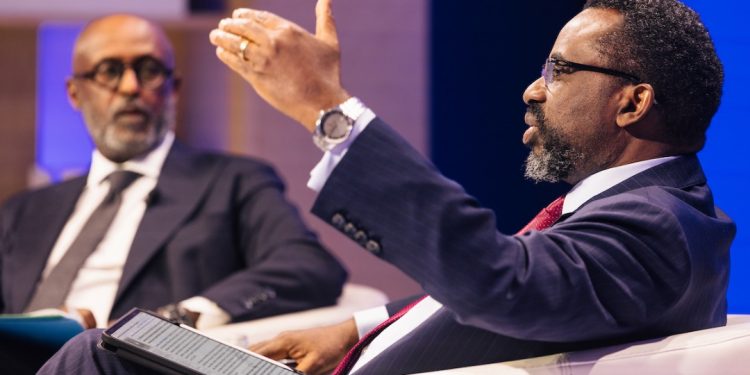Current BoG FX Framework to Limit Market Volatility, Not Defend the Cedi – Governor Asiama
Governor of the Bank of Ghana (BoG), Dr Johnson Asiama, has clarified that the Central Bank’s current foreign exchange management framework is designed to smoothen volatilities in the market rather than deliberately intervening to strengthen the local currency.
Speaking during the IMF/World Bank Governor Talk Series themed “From Crisis to Confidence: Ghana’s Journey to Macroeconomic Stabilization”, Dr Asiama stated that the BoG’s interventions are primarily aimed at ensuring orderly market operations rather than defending the cedi against the US dollar.
“Essentially, what we do is to smooth excessive volatilities, and that is what our framework has been about. There were allegations that we were intervening in the markets, but that was not exactly the case,” he noted.
Dr Asiama explained that between the second and third quarters of 2025, the Bank had to make several lumpy payments amounting to billions of dollars, particularly to Independent Power Producers (IPPs) and some domestic bondholders seeking to exit their investments following the cedi’s appreciation.
He indicated that these payments coincided with a temporary decline in remittance inflows — a key source of foreign exchange estimated at over US$6 billion annually — which required the Bank to provide short-term liquidity support to stabilize the market.
“The interbank FX market had dried up during that time, so the Central Bank needed to step in to meet those lumpy payments. I’m happy to say that the interbank FX market has since recovered, with activity picking up as mining firms are now routing their inflows through commercial banks,” Dr Asiama added.
According to him, the BoG’s approach now focuses on intermediation and reserve accumulation rather than heavy market presence. He revealed that of the US$150 million made available to the market on Tuesday, only about half was absorbed, with the remainder automatically transferred into reserves.
“We do not over-support the markets at all. All we seek to do is to limit volatilities to ensure smooth market dynamics. That’s the framework we’ll maintain going forward,” he emphasized.
Dr Asiama also highlighted the need for Ghana to deepen value addition in key export commodities — gold, oil, and cocoa — to reduce the country’s vulnerability to external shocks.
“If we can increase processing in these three sectors, we’ll significantly reduce the vulnerabilities we face as a commodity-dependent economy,” he asserted.
As of Friday, October 17, 2025, data from the Bank of Ghana shows the interbank exchange rate between the US dollar and the Ghanaian cedi stands at US$1/GHS 10.69.
Meanwhile, the International Monetary Fund (IMF) has commended Ghana’s recent foreign exchange (FX) market performance, describing the cedi’s stabilisation as a reflection of improving fundamentals, renewed policy credibility, and investor confidence.
Responding to a question from NorvanReports’ Norvan Acquah-Hayford, IMF’s Director for Africa, Abebe Aemro Selassie, acknowledged the difficult path Ghana has taken to restore macroeconomic stability following years of severe fiscal strain and uncontrolled depreciation.
“A year ago, perhaps a couple of years ago, all of the concern in Ghana was about uncontrolled depreciation and a lot of challenges,” he said. “It’s been generally positive to see stabilisation returning to the economy, growth beginning to recover, inflation decelerating, and confidence allowing the cedi to stabilise and maybe even begin to appreciate.”
The IMF’s tone marks a notable shift from two years ago, when Ghana’s currency turmoil epitomised broader debt distress across frontier African markets. The cedi lost nearly half its value in 2022 amid fiscal slippages, depleted reserves, and investor flight following the government’s decision to suspend external debt service.








